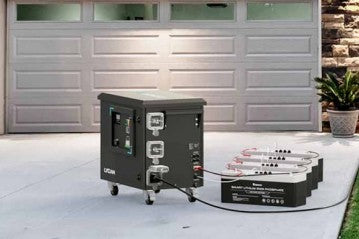
With the increasing popularity of renewable energy sources, solar power has emerged as a reliable and sustainable option for many homeowners. While solar panels capture sunlight and convert it into electricity, a solar battery is an essential component that allows you to store and utilize the energy generated. If you're considering investing in a solar battery, there are a few crucial factors you should keep in mind. In this article, we will explore three key things you should know when shopping for a solar battery, ensuring you make an informed decision for your energy needs.
1. Capacity and Power Output
The capacity and power output of a solar battery are essential considerations when choosing the right one for your home. The capacity refers to the amount of energy a battery can store, usually measured in kilowatt-hours (kWh). It determines how long your solar battery can provide electricity during periods of low or no sunlight. To assess your energy needs accurately, it's important to analyze your household's average daily electricity consumption.
Consider your energy consumption patterns, including peak usage hours and any anticipated future growth. This information will help you determine the ideal capacity required to meet your household's demands efficiently. Opting for a solar battery with a slightly larger capacity than your immediate needs may be beneficial to accommodate potential future expansions or changes in consumption patterns.
Additionally, the power output, measured in kilowatts (kW), indicates the rate at which the battery can deliver electricity. A higher power output allows for the efficient use of electrical appliances simultaneously. Depending on your specific requirements, choose a solar battery with an appropriate power output that can handle the load demand without compromising performance.
2. Battery Chemistry and Lifespan
Solar batteries utilize different chemistries, each with its own advantages and limitations. Understanding the various battery chemistries available will help you make an informed decision based on your specific requirements. The most common types of solar battery chemistries include lead-acid, lithium-ion, and saltwater batteries.
Lead-acid batteries are the oldest and most affordable option but have a shorter lifespan and require regular maintenance. Lithium-ion batteries, on the other hand, offer higher energy density, longer lifespan, and require minimal maintenance. They are more expensive upfront but provide a better return on investment over time.
Saltwater batteries are a relatively newer technology that offers a non-toxic and environmentally friendly alternative. They have a longer lifespan than lead-acid batteries but may have lower energy density compared to lithium-ion batteries. Assess the pros and cons of each battery chemistry to determine which one aligns best with your budget, performance expectations, and sustainability goals.
Considering the lifespan of the solar battery is crucial. The average lifespan of most solar batteries ranges between 5 to 15 years, depending on the chemistry and usage patterns. Be sure to check the warranty offered by the manufacturer and consider the expected lifespan when evaluating the long-term cost-effectiveness of the battery.
3. Compatibility and Integration
Before purchasing a solar battery, it's vital to ensure compatibility and seamless integration with your existing solar power system. Not all solar batteries are compatible with every solar panel system or inverter. To avoid any compatibility issues, consult with a professional solar installer or the manufacturer to determine which battery models are compatible with your existing setup.
Additionally, consider the scalability of the solar battery system. If you plan to expand your solar panel system in the future, it's crucial to choose a solar battery that allows for easy integration and expansion. Some batteries have modular designs, enabling you to add more capacity as your energy needs grow. This flexibility ensures that your investment remains adaptable and future-proof.
Furthermore, explore the available monitoring and control features of the solar battery system. Some batteries offer smart monitoring capabilities, allowing you to track energy production and consumption in real-time. These features can provide valuable insights into your energy usage patterns, optimizing your solar system's efficiency and helping you make informed decisions about energy consumption.
Conclusion
Investing in a solar battery is an excellent way to maximize the benefits of your solar panel system by storing excess energy for use during periods of low sunlight or power outages. When shopping for a solar battery, it's important to consider the capacity, power output, battery chemistry, lifespan, compatibility, and integration options. By understanding these key factors and evaluating your specific energy needs, you can choose a solar battery that suits your requirements, promotes sustainability, and offers a reliable and efficient energy storage solution for years to come. Embrace the power of solar energy and take a step towards a greener future with a well-informed solar battery purchase.

0 Kommentare